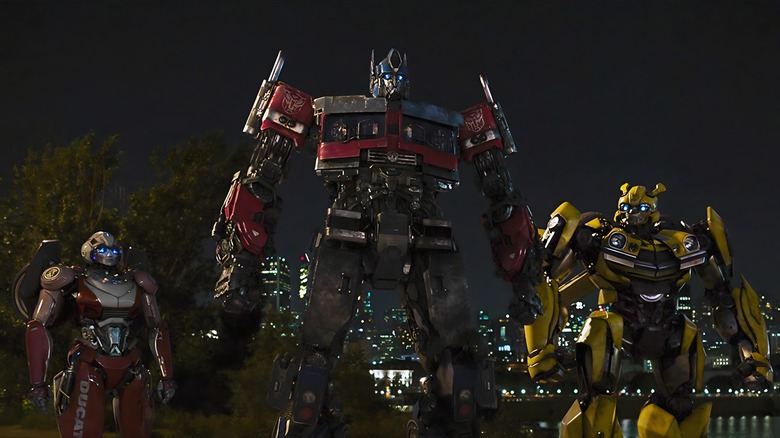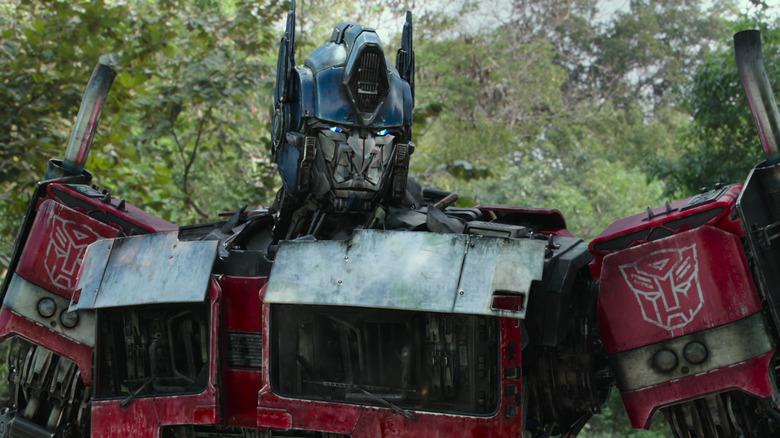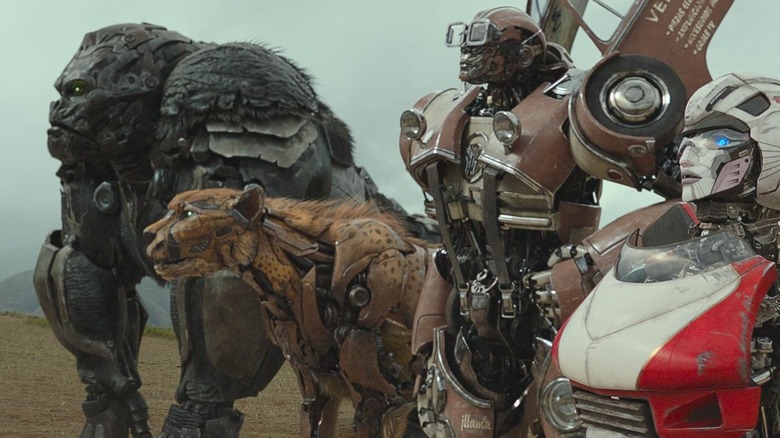Transformers: Rise Of The Beasts' Original Ending Was Too Sad For Theaters
This article contains spoilers for "Transformers: Rise of the Beasts."
In what's already proving to be a heavily divisive summer movie season, it's wild to see a "Transformers" movie be so generally accepted. The franchise became notorious during director Michael Bay's tenure for including such glorious highs as Autobots being involved with Arthurian legend and such odious lows as, well, pretty much the bulk of "Revenge of the Fallen."
The first film in the series proper to be made by a different director (if you don't count Travis Knight's spin-off prequel "Bumblebee" from 2018) is "Transformers: Rise of the Beasts" and its director, Steven Caple Jr., found himself laser-focused on providing an all-around enjoyable experience.
Not only does the film close with an exciting promise to crossover the "Transformers" with Paramount and Hasbro's "G.I. Joe" franchise, but it also features a feel-good climax that is markedly different from the original version of the film. The original ending was darker, featuring the demise and/or disappearance of two of the Autobot heroes, and Caple Jr. changed it not just based on test screening reactions but on the assumption that audiences who dealt with the COVID-19 pandemic aren't as interested in feel-bad blockbusters.
Optimus Prime and Mirage originally didn't make it
At the end of "Rise of the Beasts," the Autobots (aliens from Cybertron who turn into vehicles), the Maximals (Cybertronians who turn into beasts — stay with me, here), and human heroes Noah Diaz (Anthony Ramos) and Elena Wallace (Dominique Fishback) are attempting to stop the Terrorcons (evil Cybertronian robot folks) from opening a portal to deepest space and allowing the planet-eating Unicron (Colman Domingo) to come through to devour Earth.
During the battle, Autobot warrior Mirage (Pete Davidson) is wounded but manages to transform himself into an exo-suit that Noah wears. Meanwhile, Autobot leader Optimus Prime (Peter Cullen) attempts to save everyone by sacrificing himself while destroying the portal-opening Transwarp Key but is ultimately snatched from the brink of death by Noah/Mirage and Optimus Primal (Ron Perlman), leader of the Maximals. Later, it's revealed that Noah manages to resurrect Mirage thanks to rebuilding him with spare parts.
As Caple Jr. explained to The Hollywood Reporter, the original ending was too much of a downer and needed to be changed to what ended up on the screen:
"There was a version of the film where Prime went up into space. I think you guys are gonna see this in the deleted cuts, too, but when he actually destroyed the [Transwarp] Key, he got sucked up into the portal and ended up with Unicron. And then there was also a moment where Mirage didn't come back. So I personally thought that movie was good; we were still getting pretty good ratings around that, but something was missing. And when I realized there wasn't an applause or a cheer at the victory, it just felt a little down. So we wanted to see the heroes win: Optimus Prime, Noah, Elena. And so I went back and made sure that we had these victories throughout because it just felt a little sad."
Caple Jr. learns about fine-tuning a movie for an audience
"Rise of the Beasts" is only Caple Jr.'s third feature film, following the 2016 indie "The Land" and 2018's "Creed II." As such, he's still learning about how to make big films for a big audience, and the process on "Transformers" not only taught him a lot of general lessons, but one particular one in terms of the times we all live in now. As he explained:
"There were a few things I learned [from the test screening process], but one major one was that after 2020, people definitely wanted happier endings."
The fine-tuning of "Transformers" wasn't relegated to the ending itself, either, as Caple Jr. measured audience response to characters and even individual jokes, too, always keeping an eye on the film pleasing as large an audience as possible:
"It's always tough because it's a different crowd each time. Some people laugh at the Marky Mark joke, but then some people don't. So you never know with the audience, but for a movie that's going to be seen all over the world, I wanted there to be something for everybody."
While "Rise of the Beasts" does indeed lack the auteurist (some might even say vulgar auteurist) tendencies of Michael Bay, Caple Jr.'s more than able direction allows it to be as many things to as many people as possible, which feels perversely fresh for a "Transformers" movie. Additionally, as the director hints, his original, darker ending may actually find its way to home media as well. So if "Rise of the Beasts" was a little too feel-good for you, there may be hope for some feel-bad Transformers content coming your way in the future.


